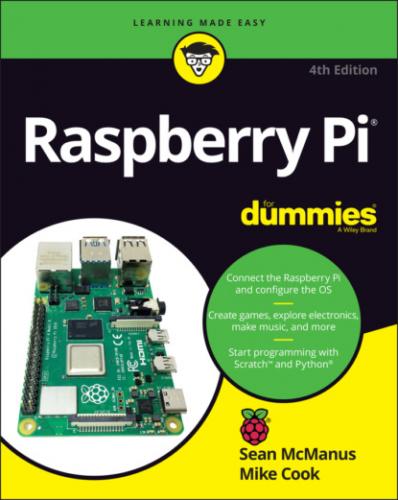Introduction
Raspberry Pi computers are at the forefront of the maker movement, where people make their own inventions using a mixture of traditional craft skills and modern coding and electronics knowledge. They’ve also given more and more people access to a computer that provides a gateway into programming, electronics, and the world of Linux — the technically powerful (and free) rival to Windows and Mac OS. As a supercheap computer, the Raspberry Pi is also being pressed into service in media centers and as a family computer for games, music, photo editing, and word processing.
You might be a geek who relishes learning new technologies, or you might be someone who wants a new family computer to use with the children. In either case, Raspberry Pi For Dummies, 4th Edition, helps you get started with your Raspberry Pi and teaches you about some of the many fun and inspiring things you can do with it.
About This Book
Raspberry Pi For Dummies, 4th Edition, provides a concise and clear introduction to the terminology, technology, and techniques that you need to get the most from your Pi. With this book as your guide, you’ll learn how to
Set up your Raspberry Pi.
Discover and install great free software you can use on your Raspberry Pi.
Use the desktop environment to run programs, manage files, surf the web, and view photos.
Use the Linux command line to manage your Raspberry Pi and its files.
Use the Raspberry Pi as a productivity tool.
Edit photos.
Play music and video.
Create animations and arcade games with the child-friendly Scratch programming language.
Write your own games and other programs using the Python programming language.
Compose music by programming with Sonic Pi.
Get started with electronics, from an introduction to soldering to the design and creation of electronic projects controlled by the Raspberry Pi.
Incidentally, within this book, you may note that some web addresses break across two lines of text. If you’re reading this book in print and want to visit one of these web pages, simply key in the web address exactly as it’s noted in the text, pretending as though the line break doesn’t exist. If you’re reading this as an ebook, you’ve got it easy — just click or tap the web address to be taken directly to the web page.
Foolish Assumptions
Raspberry Pi For Dummies, 4th Edition, is written for beginners, by which we mean people who have never used a similar computer. However, we do have to make a few assumptions in writing this book, because we wouldn’t have enough space for all its cool projects if we had to start by explaining what a mouse is! Here are our assumptions:
You are familiar with other computers, such as Windows or Apple computers. In particular, we assume that you’re familiar with using windows, icons, and the keyboard and mouse, and that you know the basics of using your computer for things like browsing the Internet, installing software, or copying files.
The Raspberry Pi is not your only computer. At times, you’ll need to have access to another computer — for example, to create your SD or microSD card for the Pi. (See Chapter 2.) When it comes to networking, we assume you already have a router set up with an Internet connection and a spare port that you can plug the Raspberry Pi into if you’re using a wired connection.
The Raspberry Pi is your first Linux-based computer. If you’re a Linux ninja, this book still gives you a solid reference on the Raspberry Pi and the version of Linux it uses, but no prior Linux knowledge is required.
You share our excitement. The Raspberry Pi can open up a world of possibilities to you!
Other than these assumptions, we hope this book is approachable for everyone. The Raspberry Pi is being adopted in classrooms and youth groups, and this book is a useful resource for teachers and students. The Raspberry Pi is also finding its way into many homes, where people of all ages (from children to adults) are using it for education and entertainment.
Icons Used in This Book
If you’ve read other For Dummies books, you know that they use icons in the margin to call attention to particularly important or useful ideas in the text. In this book, we use four such icons:
Beyond the Book
In addition to what you’re reading right now, this book comes with a free access-anywhere Cheat Sheet with tips on installing software and using Scratch. To get this Cheat Sheet, simply go to www.dummies.com and type Raspberry Pi Dummies Cheat Sheet in the Search box.
Also be sure to check out this book’s companion website (www.dummies.com/go/raspberrypifd4e), where you can download the code listings that appear throughout this book.
Both of us maintain our own personal websites too, which contain some additional information on the Raspberry Pi. Mike’s is at www.thebox.myzen.co.uk/Raspberry/Punnet.html, and Sean’s is at www.sean.co.uk.
Where to Go from Here
It’s up to you how you read this book. It’s been organized to take you on a journey from acquiring and setting up your Raspberry Pi to learning the software that comes with it, and from writing your own programs to finally creating your own electronics projects. Some chapters build on knowledge gained in earlier chapters, especially the sections on Scratch and Python — and all of Part 5.
We understand, though, that some projects or topics might interest you more than others, and you might need help in some areas right now. When a chapter assumes knowledge from elsewhere,
